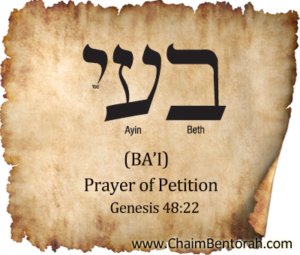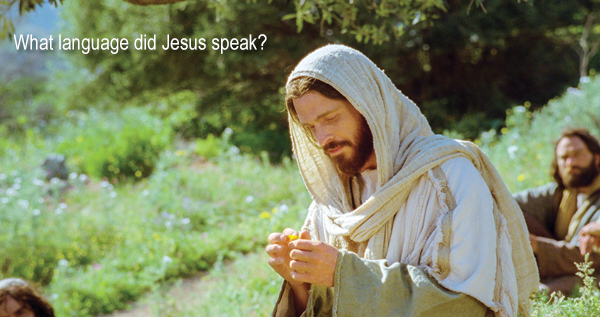Genesis 48:22: “Moreover I have given to thee one portion above thy brethren, which I took out of the hand of the Amorite with my sword and with my bow.”
 I found something interesting when reading this verse in the Jewish Onkelos Targum. The Onkelos Targum is the primary Jewish Aramaic targum of the Torah or the first five books of the Bible. A targum was originally a spoken translation of the Hebrew Bible. A professional translator would give the Torah in the common language of the listeners. This had become necessary near the end of the first century BC about the time Jesus walked the earth. At that time the common language was Aramaic and Hebrew was used for little more than schooling and worship. It was more of a ceremonial language like Latin is in the Catholic church. What makes the Targums important is that the translator frequently expanded his translation with paraphrases, explanations, and examples so that it became like a sermon.
I found something interesting when reading this verse in the Jewish Onkelos Targum. The Onkelos Targum is the primary Jewish Aramaic targum of the Torah or the first five books of the Bible. A targum was originally a spoken translation of the Hebrew Bible. A professional translator would give the Torah in the common language of the listeners. This had become necessary near the end of the first century BC about the time Jesus walked the earth. At that time the common language was Aramaic and Hebrew was used for little more than schooling and worship. It was more of a ceremonial language like Latin is in the Catholic church. What makes the Targums important is that the translator frequently expanded his translation with paraphrases, explanations, and examples so that it became like a sermon.
Writing down the targum was initially prohibited, but some Talmud writings did appear about the time of Jesus. Like our paraphrases today they were not considered authoritative. Today the common understanding of a targum is a written Aramaic translation of the Old Testament which reflects the Midrashic interpretation of the Old Testament. Today they are a source of textual criticism and give us a sort of microscopic look into the Jewish thought of the first century the era of Jesus, the disciples, the Apostle Paul and the early church.
The Targum Onkelos of Genesis 48:22 gives us such insight into first-century Jewish thought that helps shed some light on the concept of prayer. Before Jacob died he gave a blessing to Joseph’s two sons Ephraim and Manasseh. That blessing was to bequeath to Ephraim and Manasseh a portion of land (Shechem) that Jacob took from the Amorites with his sword and his bow.
Genesis 33:19 tells us: “And he bought a parcel of a field, where he had spread his tent, at the hand of the children of Hamor, Shechem’s father, for an hundred pieces of money.” There is no record in Scripture that Jacob fought for this land with swords, bows and arrows. The Scriptural reference is that he purchased the land. The Midrash talks about about a battle between Jacob and the Amorites who tried to take the land from Jacob but the only record in the Bible we have of such an attempt and resulting battle in Scripture is in Genesis 48:22. Did such a battle take place? We do know for sure but the Targum Onkelos gives us a hint.
Now in Hebrew, the word bow is qesheth which is an archer’s bow used for hunting or warfare. So, in every modern English translation, we look at qesheth and we correctly put in the English word bow. However, in our modern paraphrase versions like the Contemporary English Version they do what the translators of the targums did and that is to paraphrase. That is not to give the exact word-for-word translation but the thought of the writer of the passage that is reflected in our modern-day English. Hence, since we are not sure of a bloody battle to place to capture the land they translate this verse as “Meanwhile, I’m giving you the hillside I captured from the Amorites.” It says nothing about a sword or bow, that is because there is no indication that this land was really captured by Jacob through the use of a bow and arrows. Maybe some other method was used to capture this land. Bow and arrows could be just a metaphor, we are not sure so this paraphrase considers this and simply say it was captured by Jacob. In truth, the real capture was not through swords and bows but through the power of God.
Now, why do we question whether or not Jacob captured this territory using swords and bows, and arrows? Because the first-century targum says something a little different which hints that swords and bows are really a metaphor. Not to say that God did not use swords and bows but we need to understand it was God and not the swords and bows that captured the land. What the targum says is that the land was capture using tsali and ba’i. Both of these words are words for prayer in Aramaic. Tsali is a prayer of dedication and devotion and ba’i is a prayer of petition or request.
In other words, Jacob may have used a sword or bow and arrows to either fight or frighten off the Amorites, but the first-century Jews knew and understood that what Jacob meant and what was heard in the ears of Joseph and his sons was that he captured the land through his devotion to prayer and his prayers of petition to God.
Keeping in mind that the basic idea of prayer is an attachment to God, a notch in the tent peg that keeps us grounded in God we can see that Jacob was not a man of war but a man who attached himself to God and found victory in his attachment to God.
Let’s take this a little bit further. How is an archer’s bow like prayer? Why is an archer’s bow used as a metaphor for prayer, particularly a prayer of petition? Just like a bow, the more a person draws the bowstring to himself, the further the arrow flies. So it is with prayer, the deeper you draw your attachment to God into your heart the higher it ascends or the deeper into the heart of God your prayer request will descend.
It is interesting that the emphasis is not so much on your aim as it is on the depth that the bow string is drawn into one’s heart. We aim for a lot of things when we draw that bowstring of prayer into our hearts. Perhaps we are praying for a brand new, candy-apple red Tesla to drive little children to Sunday School on Sunday. As that bow is drawn further and further into our hearts the real prayer, the prayer from our heart and the heart of God is being touched and that is not for a fancy car to show off our wealth or prosperity but for just an adequate and safe means to transport little children to Sunday School on Sunday.
Jacob captured the land from the Amorites because that was what was in the heart of God and it was in the heart of God that Joseph’s sons who were yet born would inherit this land. Many times, our prayers, prayers from our heart may not find their complete fulfillment until long after we have left this earth as with Jacob.
Hi there! Thank you for reading this Daily Word Study. Can I ask a favor? Share this Daily Word Study with your friends on Facebook and Twitter by clicking one of the icons below.
Thanks & Blessings, it means a lot to me!








Ahhh..so powerful that our prayers, for a deep need to be met, actually are also on God’s heart! My daughter wanted a grandchild and kept pestering her daughter to give her one.
She knew she was dying, yet God put it on her heart in such a deep way, that my granddaughter, who never wanted a child, ended up knowing she was pregnant, the day we buried her mother!
This baby, Peter, is the source of our joy, peace, and comfort, following Tiffany’s death. Tiffany never knew, yet, in some way, I believe she petitioned God with such a heart as Jacob, knowing that God wanted him here on earth, and in our lives to bless and heal us in this profound way.
Thank you for clearing up this matter.
This gives me great clarity and a mental picture of prayer
Would it be wrong to apply this understanding to Psalm 144: 1?
The explanations I heard never really settled the matter for me.
Thank you
Encouraging understanding about hitting the target and speaking into existence an answer to prayer 🙏
.. what a deep insight!
Loved that he found victory through his attachment to God. What a delightful and profound observation!
My deer brother,
Thank you for sharing the thoughts on the subject of the ‘bow and arrow’.
This is an understanding that God has given me on the message of the ‘bow and arrow’. In another place it is written that children are a blessing from God. And it is also written that Blessed is the man whose quiver is full of them. Therefore the understanding of the bow and arrow message….to me Speaks of …..the Descendants of. so in a sense it could infer an overtaking not by the outpouring of blood but by the bloodline or lineage….the descendants thereof.
I pray you be blessed in my sharing even as I am in your sharing. And above all, God be Glorified. Blessings upon you.